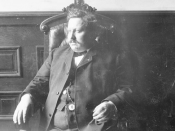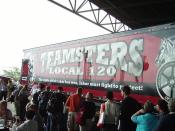Transportation industries throughout the world have played and always will play a major role in society. One of the major union movements of the twentieth century within the transportation industry here in the United States is the International Brotherhood of Teamsters (IBT), founded in Niagara Falls, New York in 1903. Prior to the founding of the IBT, the lives of the teamsters were meager at best. There was not much work to be found, and the work that was there paid for less than what the teamsters had to risk for the job. It was common during the late 19th Century and the beginning of the 20th Century for a teamster to work over 18 hours a day, seven days a week, for an average of around $2.00 a day. For this lowly wage, teamsters were required not only to haul whatever the load may be, but they also had to assume responsibility for lost or damaged merchandise as well as when the consumer decided not to pay.
It is because of these terrible and unacceptable conditions that the IBT was formed.
The teamsters union worked hard to ensure better work conditions for its members and played a major role in World War I. The teamsters were used to move troops and supplies quickly from various ports to the front lines. World War I also helped with the organizing of the IBT's efforts to improve work conditions. The union won standardized contracts, shorter workweeks, and the right to overtime pay.
Following World War I, teamsters again played a major role in history during the great depression. President Franklin D. Roosevelt relied heavily on the IBT to back his goal of pulling the country out of the depression, creating the National Recovery Administration and establishing minimum wages and maximum hours...


